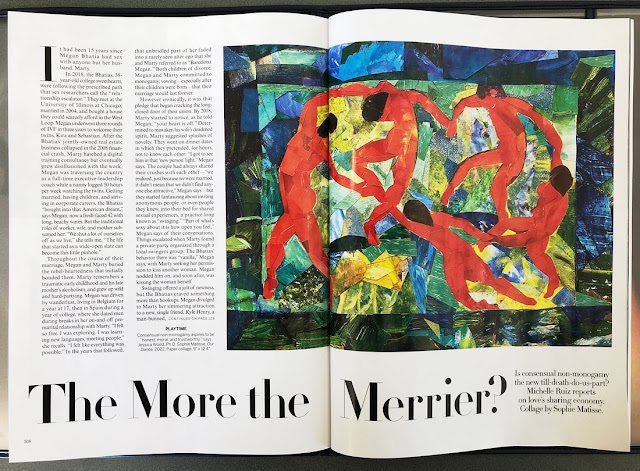Are people *really* swarming into CNM post-lockdown? Also: polybombing, YA fiction, and other polyamory in the news
By Ellen Scott...The number of Brits considering open marriages has soared by 45%, according to sex therapist Dr Tammy Nelson, who reports a dramatic rise in calls, emails, and appointment bookings from bored married couples looking for guidance on open relationships.Dr Tammy said: ‘People are emerging from the pandemic feeling the need to start picking out who the important people are in their lives and whether that’s sexually, emotionally, or romantically.‘And many of them have started to outsource their needs in the shape of affairs or by discussing open relationships.’ ...Dr Tammy, whose book Open Monogamy: A Guide to Co-Creating Your Ideal Relationship Agreement came out in January, added: ‘Couples are now keener than ever to spice things up a bit.’...Dr Tammy says the majority of the conversations are started by men, but it’s women who tend to find more fulfilment in non-monogamy. ...
Make sure you’re sure.Think about why you want an open relationship.Choose your moment wisely.Make it private.Express your desires honestly – but with kindness.Give your partner time to process.Have a chat about your ‘rules’

Spencer, Jake, Anna, and Ellie make up their polycule relationship (Spencer K / Mercury Press)
...Based in Chicago, US, costume designer Anna has three separate romantic relationships: with Jake, Spencer, and most recently, her girlfriend Ellie.[She and husband Jake] ‘are still very much in love, but I have a whole lot of love to spare for other people as well.’...Not everyone in the group is in a relationship with each other, but Anna describes theirs as a ‘kitchen table style polycule’ where everybody gets along and hangs out.Anna added: ‘I live with Jake full time, but Ellie and Spencer live in different states, and everyone has full time jobs so it’s always quite hard to schedule separate time for each individual.‘I would love for us all to be able to live together at some point, but that’s not really a viable option right now as everyone is on their own path in life.’Date nights between Anna and her individual partners are usually scheduled months in advance, and when it comes to staying in the same bed, that’s really up to everyone involved.‘When Spencer comes over, Jake tends to go and sleep on the couch,’ explained Anna.Spencer said: ‘Jake also snores! But he’s a big cuddler as well, so it’s nice to chill with him as a friend and get a hug from him every now and then.’Jake says he and Anna’s love is ‘pretty grounded’, and argues that polyamory ‘doesn’t work unless you make a point to understand your partner’s feelings and help them love who, and how, they want to.’It’s this attitude that’s meant, according to Anna, ‘there’s never any jealousy in the relationship.’She continued: ‘Polyamory really makes you look into your own feelings and where those feelings come from, it definitely puts a focus on dealing with things in a healthy way.’...
– Know exactly what you're asking for– Don't go for a threesome as your first non-monogamous experience– Keep talking– Do your own work
I have known since adolescence that I am polyamorous; I love more than one person at a time. ... My non-monogamy is what is known as "kitchen table polyamory." Everybody knows each other and we are all close. ......Couples who want to open up their relationship come to a retreat in the show; I meet with them, find out what they want to do and then come up with activities to help that along. ... Overall, I've worked with about 1,000 couples opening up their relationship over more than three decades of work as a therapist.Often people I work with haven't really talked about what they want. I frequently see couples when they have attempted non-monogamy and it's gone really badly....I advise my clients to figure out exactly what it is they want. Do they want to do things together or separately? Are they talking about opening up for life or for the short term? Are they talking just sex or do they want to be friends with people they're having sex with. After that, there still needs to be discussion about boundaries and what comes up for people.I worked with one couple, Mary* and John*.... Mary thought they were going to go and find someone for a threesome. Meanwhile, John wanted Mary to go off and have her dates while he had his separately. They had a completely different idea of what they were going to do.... So, they ended up in a fight.... I began by suggesting that they start with talking through why they wanted.... Then they were able to agree on what would work for both of them.
This couple had also never talked about sex and they had been together for about 10 years. That's not unusual, I'm afraid.
Don't go for a threesome as your first non-monogamous experienceThree is an awkward number. I can't tell you the number of couples who want a threesome and are really excited about it, and then it doesn't go well because one person feels left out. ... They came and saw me and we talked about why they didn't communicate during the situation. Having sex doesn't mean you don't talk. ... The second time this couple and a third woman talked about what they wanted beforehand and during, and everybody had a wonderful time....One of the mistakes I see people make is having an agreement with each other about the rules they're going to have and not [regularly] reviewing that. They then go out and have other relationships but they don't continue to look at what they have agreed to. Humans are not static!...Non-monogamy and polyamory require self development. ... I gently reminded [Jessie] that she had agreed to non-monogamy, so we looked at what her negative feelings were about. For Jessie, it felt like her husband was dating a younger version of her. She felt that all of her perceived flaws were being magnified, and that her husband was going to eventually run off with this other woman.I call this "Monogamy hangover." Monogamy is "either/or" whereas non-monogamy is "both/and". ...Dr. Lori Beth Bisbey is a GSRD (gender, sex, relationship diversity) therapist, sex and intimacy coach and psychologist. You can find out more at drloribethbisbey.com or follow her on Instagram @drbisbey.
Traditionalists worry that any closed relationship is at risk of being pried open against their will.

The polybomb
By Miles KleeReddit’s r/monogamy, in theory a small community to discuss the benefits and challenges of sharing your life with one committed long-term partner, more often devolves into angst over polyamorous arrangements. Formerly poly members share horror stories of open relationships that ended in heartbreak, while strident monogamists condemn the poly scene as a pit of selfishness, hedonism and false superiority. While it’s true that non-monogamous individuals can be a little smug or self-aggrandizing in their abandonment of traditional romantic mores, there is a tacit understanding throughout the subreddit that such a lifestyle can never be healthy or sustainable. They’re united in the corollary belief that only an asshole would want to try it.A newcomer lamented in a recent post that the group, instead of being “a place that supports monogamy as a normal okay thing, without shaming polyamory,” was focused on “over-generalizing and straw-manning” the practice. An established user replied that such venting was necessary, “since so many people here have been polybombed and manipulated, and so many poly people like to manipulate.”...Someone who proposes marriage isn’t “matrimony-bombing.” These are decisions made between two adults with equal say in the matter [or ought to be. –Ed.] But r/monogamy operates from the assumption that the “polybomb” is a concerted attack, unforgivable in its own right.No doubt this is partly the result of both sides’ unfortunate tendency to value their chosen paradigm by disparaging the opposite — that is, endorsements of either monogamy or polyamory may proceed from a case for why the other model is unrealistic or “wrong.” ...
By John Stoltenberg...Erica Smith’s charming new play Fiveplay is set in the shared household of an assortment of idiosyncratic personalities in their twenties. ...The housemates of Fiveplay are all polyamorous, which one of them helpfully explains early on, in an amusing teach-the-audience scene:AVERY: Polyamory is being involved in multiple committed relationships at once with — and this is the most important part — the full consent of everyone involved. Also referred to as a form of ethical nonmonogamy. I’m gonna repeat that: ETHICAL nonmonogamy.Someday some smart TV producer is going to notice the zeitgeist is ready for a sitcom based on this provocative premise — it’s only a matter of time.... Perhaps that polyamorous reimagining of Friends will be inspired by Fiveplay, who knows? ......Keeping track of who’s having relations with whom can get complicated. So you’ll thank me, when you see Fiveplay, for this handy color-coded diagram:
One of the most interesting things about Fiveplay is what it’s not. There’s a lot of situationally appropriate hugging, kissing, and other casual affection and a lot of banter about an upcoming special event (a house orgy they call Fucksgiving), but no clothes come off, there are no sex acts, and nobody objectifies or body-judges anyone else. The actors who very capably play the five polyamorous characters ... and the sole character not coupled lives in the moment in their interrelationships as if nothing at all out of the ordinary is going on. It’s simply their chosen everyday family, they are refreshingly at ease in it, and the eroticism between them can be sweetly funny....When dramatic conflicts arise, it’s never about jealousy or betrayal or any stereotype one might have about these people’s multiple sex-partnering. Instead, it’s tensions and incursions from outside — an antique suspected of being haunted, the curtly texted news of a beloved grandfather’s death, the antipathy of offstage parents — all episodes that while not particularly earthmoving, illustrate how the premise of polyamorous housemates could well be deployed in a [TV] pilot. ...
By Tirzah Price...The first instance of polyamory in YA that I remember reading was in Malinda Lo’s Adaptation and sequel Inheritance [where] Reese develops feelings for Amber and enters into a relationship with her even as David indicates he’d like to start a relationship with Reese. The love triangle is fraught, until it’s suggested that Reese date both Amber and David. The second book ends with an epilogue ... that informs readers that Reese has proceeded with polyamory and that while it’s not without its struggles, it’s been a happy solution. However, Lo gave little indication and details about said struggles, and I was left feeling a bit disappointed that after seeing the love triangle play out up close, we didn’t get to see the solution in action.
And on the grim new world-era we are entering... some perspective.
Don't miss Polyamory in the News!
SUBSCRIBE by a feed, or
SUBSCRIBE by email
_________________________
[Permalink]











